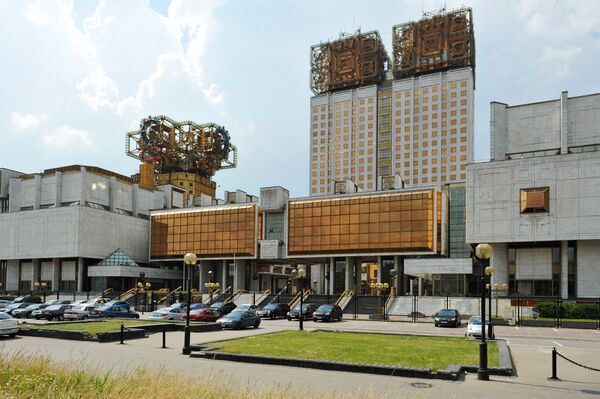MOSCOW, September 18 (RIA Novosti) – A bill to hand over control of research institutions in Russia from the country’s Academy of Sciences to the federal government was approved on Wednesday in the federal parliament despite vehement objections from the scientific community.
The landmark bill, which has yet to be approved by the upper house of parliament and signed by the president, was hurriedly passed by the lower house of parliament, the State Duma, on Wednesday in the second and third readings while hundreds of scientists were rallying outside the legislature’s building.
Despite decades of decline since the end of the Soviet Union, the Academy of Sciences is still the country’s leading scientific research establishment comprising about 50,000 researchers across its 434 scholarly institutions.
According to the bill, control over the academy’s institutions would be handed over to a new state agency, except for those institutions subordinate to the academy’s three regional branches: Siberian, Far Eastern and Urals.
The draft law bars the state from interfering in the academy’s scientific work, but its main provision says that the three major Russian academies should be merged into one with a single managing body, and also that the right to manage the academic property is to be transferred to the special state agency.
According to the bill, introduced by the government in late June, the incumbent head of the academy will stay in office for at least three years after the reform.
At least two activists protesting against the reforms were detained outside the Duma on Wednesday. Police reported that some 200 people took part in the protest against the changes.
“This is destructive. State officials … can’t really control science because they poorly understand it,” academy member Vsevolod Bagno told RIA Novosti in comments about Wednesday’s vote.
A ruling United Russia party lawmaker who heads the parliament’s education committee, Vyacheslav Nikonov, defended the bill by saying that fellow lawmakers have tried to address the scientists’ requests.
“We promised to improve the bill, and it has been improved at many points,” Nikonov said after the vote.
A crucial point in the bill – one that was not priorly discussed with the academy – was a proposal to hand over control of the academy’s 434 research institutions to a new government agency that would manage their assets and appoint their leadership. The bill was at once approved in the first and second readings, prompting outcry in the scientific community, and was then amended and returned for a new second reading.
The new government agency, which will be answerable directly to the prime minister’s Cabinet, will also approve directors of the academy’s scholarly institutions on the nomination from their staff.
Critics said the move would spell the end of Russian science because governmental bureaucrats are not qualified to manage complicated scientific matters.
“I need a magnetometer. What official can say, OK, you need it; we’re getting it for such-and-such sum? They have no idea what it is and what the tasks are that I need it for. Only a scientist knows that,” Anatoly Deryagin of the academy’s Institute of Metal Physics told RIA Novosti at an unsanctioned rally outside the Duma building on Tuesday.
The bill was fast-tracked by the Duma in two of three readings in July, but then put on hold following protests from academy members.
The academy’s president-elect, Vladimir Fortov, said after a meeting with President Vladimir Putin earlier this month that the Kremlin had promised to amend the bill in line with the scientific community’s demands.
The reform has led to a public clash between scientists and authorities: Academy supporters have held numerous rallies across the nation since July – though turnout was moderate at best – and an exposé was published this week saying 25 lawmakers who backed the bill had plagiarized in their academic dissertations.
In the meantime, state-run national television showed broadcasts accusing academy leadership of mismanaging assets. Some allegations were confirmed by a prosecutor’s check but did not lead to any charges. The academy’s bosses threatened to sue television stations over the reports.
The academy, founded in 1724, is still responsible for more than a half of all Russian scientific publications. But it has been flagging since the Soviet Union’s demise, with defenders attributing the decline to chronic underfunding that has lead to brain drain among the younger generation of researchers. Critics say the decline is because the academy has an obsolete structure, including a focus on permanent staff positions, which allegedly decreases staff’s motivation to push forward with research.




